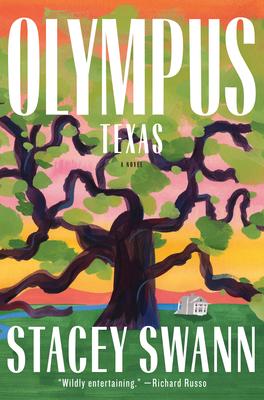This is a book I’ve been recommending lately, and it’s one you may not have heard of (I discovered it through Modern Mrs. Darcy’s summer reading list. This debut novel is a story about a dysfunctional family in small town Texas, and it’s based on the stories and themes of classical mythology. I thought it was fantastic. Most of the time I wasn’t even thinking about the mythology, I just wanted to see what would happen to the characters.

I grew up loving Greek mythology, from the D’Aulaire’s illustrated version to Edith Hamilton to (best of all) The Clash of the Titans. The stories are so full of drama, so utterly unbelievable and tragic. The gods play with humans like they are toys, but at the same time they are so terribly human – full of petty jealousy and anger and vanity.
In Olympus, Texas, we see these same characteristics in the Briscoe family. Peter, the father, is a womanizer who’s got illegitimate children all over town (including one conceived right before his wedding). He also owns most of the real estate in town, as he doles out favors and calls in debts. June is his long-suffering wife. March is their hell-raising son, in contrast to his very responsible brother Hap. Artie and Arlo, are the twins Peter had with another woman.
As I was reading, I wasn’t looking for one-to-one correspondence between the characters and the gods, though Peter is obviously a stand-in for Zeus. Looking too closely at the parallels would have detracted from the story. I thought Swann brilliantly used the themes of the myths (jealousy, vanity, lust, etc.) and shows those themes playing out in this small town where everyone knows everyone else’s business.
You will find most of these characters unlikeable, as they manipulate each other and drive each other to do terrible things. But Swann also makes them relatable and sympathetic, especially the women. The characters initially seem to embody stereotypes but gradually Swann makes them real and complex. For example, June isn’t just the long-suffering wife, she’s also a mother who has damaged her two sons with her pride and anger. Artie (the huntress) seems to be a strong, independent woman until she realizes how much she’s bound her life to a brother who doesn’t do much for her in return. And Vera, Hap’s wife, is more than just a faithless wife; she struggles to be seen for more than her beauty.
At its heart, this is a book about love and the damage people do to each other. June and Peter’s flawed relationship has ripple effects on their children, who define love by what they don’t want it to be.
June has always been wrong in her assumptions about love–so wrong, in fact, that at this point she should assume the opposite of what she believes and then be right for once in her life. The most ridiculous, looking back, was her assumption that true love bestowed a contentment that blotted out all else. June blamed her assumption on the books she had read from ages ten to sixteen, even though she could blame herself for not noticing what the books showed bore no resemblance to her firsthand experience of matrimony, her parents. June had figured the problems lay in her parents as human beings and not some defect of love. She hadn’t yet learned that since love was the creation of two people, and people were always defective in one way or another, then the love itself was necessarily flawed.
Olympus, Texas by Stacey Swann
There are situations in this book that aren’t entirely believable, until you look at them in light of the mythology. Everything is bigger than life. It’s an explosive, dramatic page turner, but what I liked most about it was Swann’s insightful writing of each character and how each comes to understand themselves better. I love a book where the characters are all flawed and all have good and bad elements, and none of the issues are easy to reconcile.
By coincidence, I read another book with themes of classic mythology around the same time, Alex Michaelides’ The Maidens. I was much less enthused about that one, which felt like a pretty cookie-cutter thriller, using a lot of academia tropes, and while the study of Greek mythology was interesting, it didn’t have the nuance or character development that this book did.
For a debut novel, I enjoyed this book immensely and recommend it for anyone who’s looking for a good dysfunctional family drama. Knowing classical mythology will give you a greater appreciation for this book but it’s also not necessary to know more than the basics.

